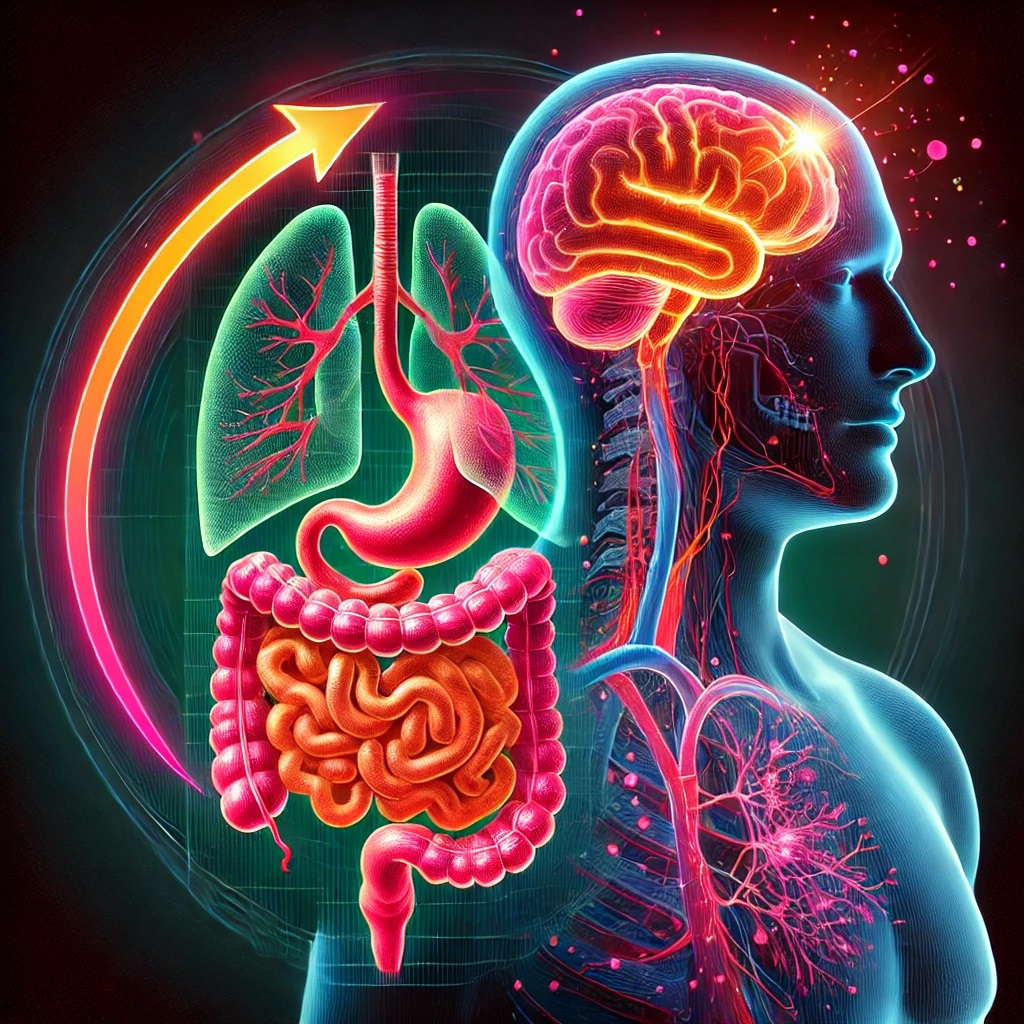By Sharon Lewis, MEd, CFNC Certified Functional Nutrition Counselor
One of today’s hot research areas is the human microbiome and its effect on your brain and overall health. The human microbiome is the bacteria, viruses, and fungi that live in and on the human body. For the sake of this article, all the organisms that live in your digestive tract.
These organisms are beneficial because we suffer from deficient or poor health without them. These microbial species contribute to the broader genetic portrait of being a human. We have a helpful relationship with these microbes. They are more than just our genetics. (Human microbiome | Definition, Examples, & Facts | Britannica)
The gut-brain axis is a two-way highway, with information traveling down from the brain to the gut and information traveling up to the brain from the gut. This pathway constantly exchanges information that impacts your brain and your digestion.
The Vagus Nerve
According to the Cleveland Clinic, the vagus nerves are the primary nerves of your digestive system. These nerves control specific body functions such as digestion, heart rate, and immune system. This nerve is the physical highway of the gut-brain axis.
The gut is the “second brain” because it has its own nervous system, the enteric nervous system (ENS). This part of the nervous system is involuntary and outside your control. Coordinated signals from the ENS generate movement and stimulate digestive tract functions, ranging from nutrient absorption to the release of enzymes that assist with the breakdown of food to elimination.
The ENS is not capable of the type of thoughts generated by the brain but is known to trigger significant emotional shifts experienced by people who suffer from irritable bowel syndrome (IBS) and chronic bowel problems like diarrhea, bloating, stomach/intestinal pain, and constipation accompanied by bloating and gas.
Digestive Disorders of the Gut-Brain Axis
A recent article by Johns Hopkins, “The Gut-Brain Connection,” states that “for decades, researchers and doctors thought that anxiety and depression contributed to these problems. But our studies and others show that it may also be the reverse. Researchers are finding evidence that irritation in the gastrointestinal system may send signals to the central nervous system (CNS) that trigger mood changes.” Brain Basics: The Life and Death of a Neuron | National Institute of Neurological Disorders and Stroke
This new information explains the correlation between a high percentage of people with IBS and functional bowel problems developing depression and anxiety. Some of the other issues of the digestive tract are dyspepsia (indigestion) and Gastroesophageal Reflux Disease (GERD). These chronic conditions are disorders of gut-brain interactions. The Gut-Brain Axis Explained in Plain English | Diet vs Disease (Ref)
Mental Health and Neuropsychiatric Disorders
We know that an imbalance in the gut microbiome causes impaired brain and nervous system function. As a result, cognitive disorders such as age-related dementia and its associated chronic inflammation develop.
Other conditions studied for their relationship to this gut-brain microbiome imbalance include:
- Schizophrenia
- Alzheimer’s Disease
- Autism Spectrum Disorder
- Bipolar Disorder
- Parkinson’s disease
- Attention-deficit/Hyperactivity Disorder (ADHD)
Gut-Brain Connection: The Key to Better Mental and Physical Health – Cielo Daily (Ref)
Trauma and the Gut-Brain Axis
Other recent discoveries include the link between trauma-related disorders and the gut microbiome. Research reveals that Post Traumatic Stress Disorder (PTSD) and Adverse Childhood Events (ACEs) are associated with imbalances in the gut-brain axis. A better balance of the intestinal flora can best manage these conditions. Gut-Brain Connection: The Key to Better Mental and Physical Health – Cielo Daily(Ref)
Practical Tips for Improving Your Gut Health
According to an Eating Well magazine article, “12 Foods to Improve Your Gut Health Overnight,” include eating probiotic foods daily. Probiotics are the beneficial bacteria found in fermented foods such as kefir, sauerkraut, kombucha, Greek yogurt with live cultures (watch the sugar), tempeh, and kimchi.
The best sources of probiotics are in the refrigerated cases at the grocery store. When adding them to your diet, go slow because if you are not used to them too much too soon it could cause bloating and intestinal discomfort.
Add These to Your Diet
Prebiotic foods are also beneficial. Prebiotics are indigestible fibers found in food. The best sources are oats/whole grains, artichokes, garlic, mushrooms, soybeans and dragon fruit. Again, go slow when adding new food to your diet. You need to see how your body reacts to them to determine if they are suitable for you.
Eat healthy fats. That would include the Omega-3’s from fatty fish (salmon, mackerel, sardines), walnuts, and flaxseeds (ground or oil). Healthy fats reduce inflammation and support a healthy brain. Also, consider finding ways to reduce your stress and get daily exercise. 12 Foods to Improve Your Gut Health Overnight (Ref)
Modern medicine is making great strides in understanding the Gut-Brain Axis. However, for centuries, Chinese Medicine and Ayurvedic Medicine have recognized that the issues expressed by the brain are connected to the gut and vice versa. You can embrace sayings like “trust your gut” and be confident when you have a “gut feeling” about a situation because the “butterflies” in your gut are giving you accurate information.





